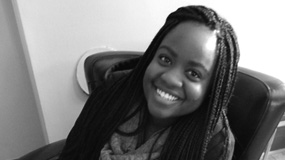
When we think of Black History we tend to think of Martin Luther King Jr, Rosa Parks, Malcolm X—the ‘celebrities’ of the human rights struggle. But Black History and culture is much more than this, and happens at the level of the body. Arthur sat down with Trent African Caribbean Student Union (TACSU) Secretary Yori Wallen and TACSU Director of Publicity Doreen Appiah-Kubi to talk about black hair culture.
Black hair culture itself has a history. “Through time we have gone through phases,” says Doreen.
“We’ve had the jheri curl phase, and also black women trying to go for that European straight hair look. Now we’re coming back slowly to ‘the natural’ and those types of looks. It’s just been a journey in itself.”
“You can do whatever you want with it. One day you can wake up and say ‘hey, I just want to go natural.’ The next day you wake up and think, ‘I just want to put a weave on,’” says Yori.
They define ‘natural hair’ as the classic and iconic afro hair style. About the style, Doreen tells Arthur, “For some reason there is a negative connotation when it comes to natural hair. I don’t know why that is, but I think all types of hair styles are beautiful really. It’s just embracing it.”
Yori adds, “When you think of kinky hair you think of tough hair, but it’s not that at all.”
For Doreen this misconception is slowly being corrected, as she says, “Right now I think most people are embracing their natural hair.”
Traditionally, natural hair has been a mark of difference for black people. In 1926 Langston Hughes touched on the topic briefly in his essay “The Negro Artist and the Racial Mountain,” where he urges for black artists to embrace their blackness in their work.
The Civil Rights Movement saw a revival of the “black is beautiful” attitude, with many people, notably Angela Davis and the Black Panthers, wearing the hairstyle as a political statement.
Despite the efforts of these people, racism still occurs today. Yori tells Arthur, “On campus it feels more homey and everyone accepts everyone for who they are… but if I go to downtown Peterborough I get stares sometimes or I get a confused face. Just little things. And when they see that I’m a Trent student it’s just like ‘oh … okay’ and that type of thing.”
Doreen is even aware of ways in which racism exists on campus, “I was talking to people the other day and they were telling me of some experiences they had. There’s racism and different treatment for international students … a teacher would go ‘Are you from here?’ ‘Is English your first language?’ … There was another individual who is from [Canada] not being treated the same as other students. I found it baffling when I was hearing that.”
Representations of black people in the media often reaffirm the privileging of straight hair.
“You see a lot of African American celebrities who always have the long, blonde, dyed hair. I see a lot of teenagers today trying to start that trend of wearing exactly what they see celebrities wearing,” says Yori.
But positive images of black hair exist as well. For Doreen, “Some people display the different types of hair that can be done.”
As an example, Yori points toward Keke Palmer who “posted a picture online of her natural hair … everyone is so surprised when they see someone’s natural hair, but it was a very positive thing because she was showing that you can’t be sucked into everything that’s going on [in the media].”
As for Black History Month, both Doreen and Yori are optimistic, but think that more work needs to be done.
For Doreen, “It’s important, but sometimes the interest is just not there and when you try to organize events the support’s just not there.” To combat this she says, “We have to get more support from other people and get more people involved, and maybe the interest will start sparking again.”
As far as Yori is concerned, “It shouldn’t be based on just one month. It should be looked upon throughout the year… I know there’s more than the two national spokespersons for Black History, and even African-Canadians, as well.”
Doreen agrees that “there’s so many things we can dive into, but we should do it throughout the year.”
TACSU continues to hold awareness-raising events throughout the year. They will be holding a movie night February 26 where they will be showing Django Unchained. On March 9 there will be a “Casino Royale” formal at Junction, which will be the group’s main event for the year.
More information about TACSU’s events can be found on their Facebook page.



